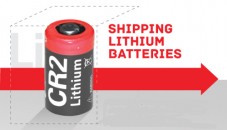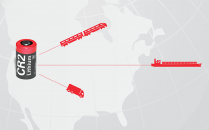Transporting lithium batteries by air continues to get more challenging. Lufthansa has just imposed restrictions that go well beyond international regulations. Here’s a breakdown of the new restrictions, effective August 31*: Complete embargo of excepted standalone lithium batteries from all aircraft. These shipments will no longer be accepted on any Lufthansa Group passenger or…
10 Reasons to add barcodes to your Dangerous Goods labels
Dangerous Goods (DG) identification and shipping is complex. One way to simplify things is by adding barcodes to your labels. When you make every DG container and package barcode-scanable, you’ll improve processes, reduce human error, cut down on frustrated shipments and carrier rejections, and keep labeling in compliance. Many Labelmaster customers specify labels with barcodes,…
Boeing Offers Lithium Battery Air Transport Guidance
Seldom does a guidance document from a private business causes much stir in the aviation transport community when it comes to Dangerous Goods; however, that is not the case after the Boeing Company released new guidance on July 17th regarding the bulk carriage of Lithium Ion Batteries (UN3480) on its passenger aircraft. Along with European maker Airbus,…
Regulatory Issues Addressing Crude Oil / Ethanol Shipments by Rail
Wednesday, June 3, 2015 at 2:00 p.m. CT It is more important than ever for companies that ship crude oil and flammable products to ensure they are compliant. In this webinar you will learn about: Proposed tank cars for North America. Compliance with DOT/TSA regulations – shipper and carrier requirements Exceptions taken by DOT inspectors…
UPS Imposes New Lithium Metal Battery Restrictions
In an action which is assuredly no April Fool’s jest, United Parcel Service (UPS) today announced new restrictions on and requirements for the transport of Lithium Metal Batteries. Effective July 1st, 2015, shipments of UN3090 Lithium Metal Batteries via UPS Airlines must receive pre-approval from UPS prior to shipment. The announcement indicates that this will…
Infographic | What Makes Lithium Batteries Special?
What is it about lithium batteries that makes them so effective at powering the world around us? What is it about them that classifies them as Dangerous Goods? This infographic takes a quick look at the remarkable technology behind these high-energy power sources and offers tips for ensuring safe and compliant shipping. To…
Shipping Dangerous Goods by Air—Why Was My Shipment Refused?
Previously recorded on Wednesday, March 18, 2015 at 2:00 p.m. CST Shipping dangerous goods by air seems to have the most frustrated shipments. Sometimes the reason seems to be trivial. Join Jim Shimko, Labelmaster Services and Angel Collaku, Compliance and Enforcement Division Manager from the FAA, as they discuss some of the more common errors…
PHMSA Announces Mandatory Compliance Date Extension to HM-224F for Non-Air Transport of Lithium Batteries
Announced via the website of the Department of Transportation, Pipeline and Hazardous Materials Safety Administration (DOT PHMSA): as a result of numerous stakeholder comments, PHMSA will respond to concerns regarding difficulty in achieving full compliance by the original date set forth in the timeline mandated by the August 6th, 2014 final rule. The agency announced…
Postal Service Revises Mailing Standards for Lithium Batteries
Keeping pace with U.S. DOT’s PHMSA (U.S. Department of Transportation, Pipeline and Hazardous Materials Safety Administration) the U.S. Postal Service announced changes to their respective hazardous materials standards affecting the safe transportation of lithium ion and lithium metal batteries. According to the Notice published in today’s Federal Register (January 26, 2015, Volume 80, No. 16,…
ICAO releases Corrigendum #1 for the 2015 – 2016 edition; addresses the carriage of Lithium Metal Batteries aboard passenger aircraft
On December 10th, 2014, the International Civil Aviation Organization (ICAO) issued an Electronic Bulletin (EB 2014/72) which announced the release of Corrigendum #1 (itself dated November 20th, 2014) to their 2015 – 2016 edition of the Technical Instructions for the Safe Handling of Dangerous Goods, commonly referred to in the industry as the ICAO TI. The…







